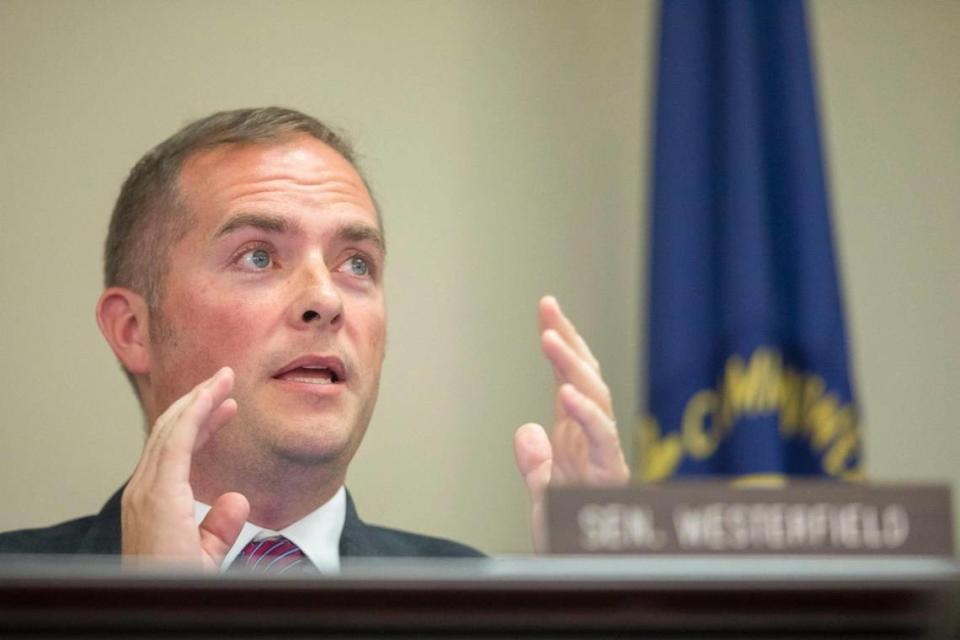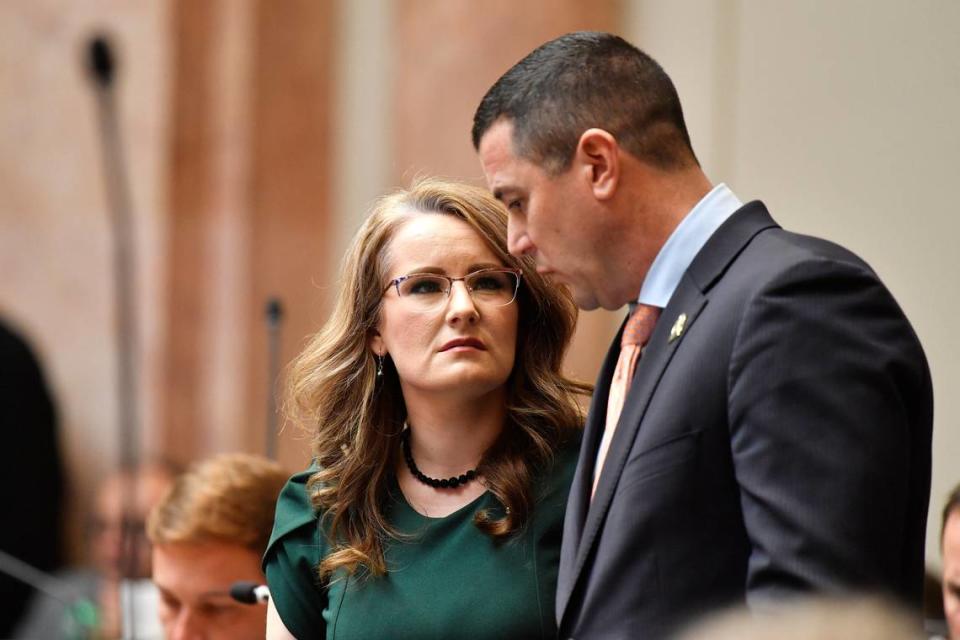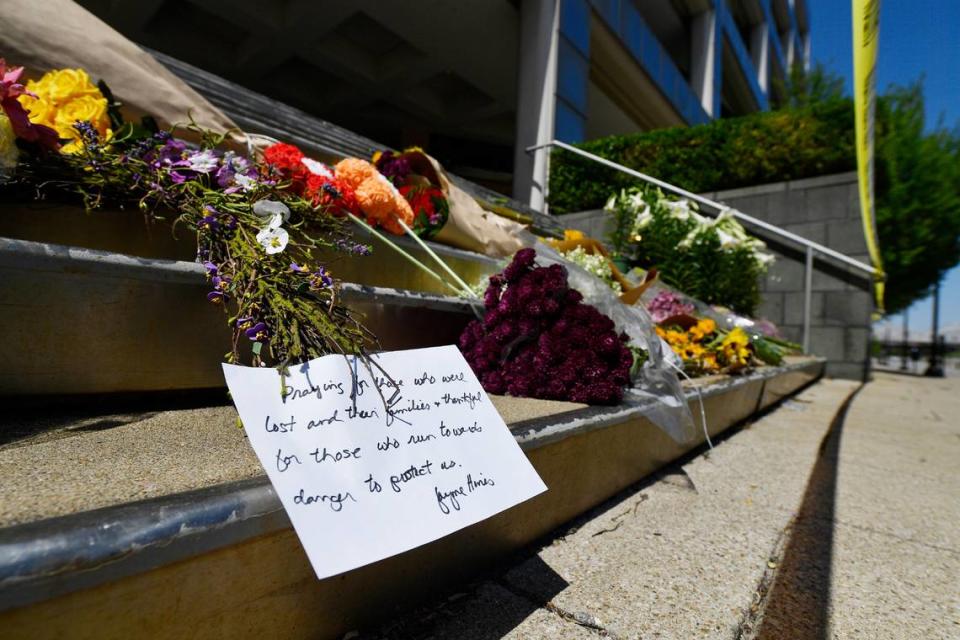KY lawmakers will hear bill on removing guns from people in crisis. Will it pass in 2024?
- Oops!Something went wrong.Please try again later.
There is a renewed legislative effort in Kentucky to allow for the temporary removal of guns from people who have shown signs they could be a risk to themselves or others.
But with a Republican-dominated legislature, proponents of the measure know they face an uphill battle in the 2024 General Assembly — even with a GOP senator sponsoring the bill and the Old National Bank shooting in Louisville earlier this year still on the minds of many.
Sen. Whitney Westerfield, a Republican from Fruit Hill and the Senate Judiciary Committee chair, will carry the bill in the upcoming legislative session. It has bipartisan support from Senate Minority Whip David Yates, D-Louisville.
“My hope, I hope against hope, regardless of what any legislative solution looks like, that we can find common ground that there is a population of Kentuckians that need some sort of help or intervention,” Westerfield told the Herald-Leader. “I think it’s painfully obvious that there’s a group of Kentuckians that we need to respond more adequately to, that are still law-abiding, but we have concerns about whether or not they pose a danger.”

The proposal Westerfield is putting forth is called CARR, an acronym for Crisis Aversion and Rights Retention orders. Similar legislation elsewhere has been called ERPO, or extreme risk protection orders, or more colloquially — and politically charged — “red flag” laws.
Currently, 21 states and Washington, D.C., have such laws on the books, including neighboring Illinois, Indiana and Virginia.
The bill draft has not yet been published, but Westerfield said the gist is the creation of legal pathway to remove firearms from those who could become violent, but in a way that protects people and their rights.
“If I’m struggling with depression, I don’t necessarily want my guns to be taken away from me,” Westerfield said. “At the same time, if I start posing a threat to myself, or to others, I want (my wife) Amanda to have something at her disposal to intervene in case I’m not in a frame of mind to do it for myself, in a limited way that is regularly reviewed and I have regular opportunities to show that I’m better and I’m OK. I’m willing to entertain any other changes to the bill that people wish to recommend or suggest. I’ll keep an open mind.
“It’s my hope that, particularly the opponents, are willing to at least consider it and not dismiss the idea out of hand.”
Westerfield’s proposal will be a subject of an interim joint judiciary hearing Friday at 10 a.m. in Capitol Annex room 154.
Critics ‘building coalition of opposition’ to CARR
CARR has already come under criticism from the informal “Liberty” wing of the Kentucky GOP, with figures like Northern Kentucky attorney Chris Wiest and former candidate for treasurer Andrew Cooperrider rallying opposition to it online and encouraging attendance at Friday’s hearing.
The measure may have no opponent more fierce than Rep. Savannah Maddox, R-Dry Ridge, who sits on the interim judiciary committee.
Maddox sponsored an ultimately unsuccessful bill in 2023 that would have allowed for the carrying of concealed guns on college campuses, and in 2019 she was given the .50 Caliber Freedom Award from the National Association for Gun Rights for her work in passing permitless carry.

“Whether we are using the euphemism of CARR or ERPO or any type of legislation that I have seen, any proposal that I’ve seen thus far in Kentucky, or frankly, other states, it all centralizes around a concept that has the potential to violate at a bare minimum at least three constitutional rights, in terms of our Fourth Amendment, 14th Amendment and of course, our Second Amendment rights,” Maddox told the Herald-Leader. “Not just the basis of violation of constitutional rights, but also conceptually due process and even the presumption of innocence which is firmly enshrined in our American legal system.”
Maddox says she does not see broad support for CARR after having spoken to a number of her fellow lawmakers.
“But the fact that we are even contemplating gun control legislation in a supermajority of 111 out of 138 (legislators in the House and Senate combined) is something that gives me great pause,” Maddox said. “My goal with speaking vocally and building a coalition of opposition is to ensure that this type of gun control legislation doesn’t get a foot in the door.”
Maddox said she anticipates filing legislation in 2024 “to abolish these so-called ‘gun-free’ zones.”
“I’m going to make good on the promise of actually approaching a policy solution that will work to enable people to keep themselves and their families safe,” she said.
‘Critical mass necessary to affect change’
This isn’t the first attempt to pass extreme risk legislation in Kentucky.
In 2019, a trio of senators — then-Senate Minority Floor Leader Morgan McGarvey, a Louisville Democrat now serving in the U.S. House of Representatives, joined with Senate Majority Caucus Chair Julie Raque Adams of Louisville and then-Sen. Paul Hornback, R-Shelbyville — announced they’d back such legislation soon after the mass shootings in El Paso, Texas, and Dayton, Ohio.
Whitney Austin, founder of Whitney/Strong and the survivor of a 2018 mass shooting in Cincinnati, said the proposal has been modified in the years since the bill was first introduced, largely because of the feedback of concerned elected officials.
“This year will be no different, and it’s going to appeal to them in a way that I think maybe (it) has not appealed to them in the past,” Austin said. “I’m asking for open ears and open hearts, and a (willingness) to solve problems, because I think we’ve put together a very, very good solution for Kentucky.”
Austin and Westerfield both emphasized in separate interviews with the Herald-Leader that this bill’s path to gun removal orders is very narrow and focuses on a small subset of the population that’s in crisis.
That tailored, unique-to-Kentucky approach gives Austin confidence this could be the year CARR passes.
“I feel really good. There is no guarantee with anything, especially with legislation, but I’ve been through this experience before with the passage of the bipartisan Safer Communities Act,” she said of the 2022 federal law. “There are just special moments in time where you have the critical mass necessary to affect change, but you also have elected officials who are primed, either through their minds or their hearts, to be receptive to finding a solution.
“I think we’re in that special moment in Kentucky, especially after the mass shooting that happened at Old National Bank in April. I really feel as if this is our moment.”

Should such a bill reach the desk of Democratic Gov. Andy Beshear, who began his second term Tuesday, previous comments indicate he’d be likely to sign it, even though he describes himself as a “strong supporter” of the Second Amendment.
Beshear expressed support for “red flag” legislation while campaigning for governor in 2019, and reiterated that support earlier this year following the Louisville bank shooting.
“We’ll certainly have those conversations,” he told CNN in April. “I don’t want to give anybody false hope, but I’m going to continue – maybe I can share even my perspective on what it’s like having a friend murdered.”
Beshear was personally affected by the Old National Bank shooting: his close friend Tommy Elliott was among those killed by the 25-year-old shooter, who purchased his Radical Firearms RF-15 and 120 rounds of ammunition six days earlier.
The shooter, who was killed on scene by a responding Louisville Metro Police officer, wrote the attack was “something I have to do,” according to documents released by police last month.
“Perhaps this is the impact for change — upper class white people dying,” he wrote. “I certainly would not have been able to do this were it more difficult to get a gun.”
Ryan Straw, vice president of the Kentucky State Fraternal Order of Police, met with Austin last month to discuss the CARR proposal.
Straw said the FOP has not endorsed the bill, but many in law enforcement recognize “there are some common-sense things that we may be able to be supportive of.” Some members see it as a potential “extra tool in their toolbox,” while others have concerns about this being an additional burden placed on law enforcement.
“I do think, regardless if it passes or not, you’re going to see law enforcement groups this time more engaged with groups like Whitney/Strong and any other kind of gun reform or criminal justice reform groups,” Straw said. “I think you’re going to see us wanting a seat at the table for those conversations.”
‘Definitely a Kentucky problem’
While mass shootings may bring these laws to the forefront of public discourse, advocates believe they could be effective in another way: preventing suicides.
Cathy Mekus, a longtime volunteer with Moms Demand Action of Kentucky, is thrilled Westerfield has taken up the cause of CARR.
“As a general thing, we support bills that are along this vein, that give law enforcement and family members the opportunity to take action if they know that there’s an issue,” Mekus said, noting she has not seen the CARR draft. “They know that their loved one has an issue, whether it is an intent to commit suicide or a mass shooting.”
Mekus said while these bills across the nation may have some of the same features, they’re not carbon copies of one another.
“This CARR bill is written very specifically for Kentucky. It’s not the same as any other bill out there, and that’s important because it takes into account Kentucky’s unique heritage and interests,” she said. “We expect it to be the kind of bill that can get a pause in the case that someone is considering taking their life or harming others.”
A 2020 report from the research arm of Everytown for Gun Safety — a nonprofit organization “dedicated to understanding and reducing gun violence in America” — analyzed firearm suicide data from the Centers for Disease Control and Prevention for each congressional district.
The 5th District in Eastern Kentucky, represented by U.S. Rep. Hal Rogers, has the ninth-highest rate of firearm suicides in the nation, with 13.6 per 100,000 people, compared to the national average of 7.1. Seventy-three percent of suicides in that district are with firearms; the national average is 50%, the report found.
Additionally, from 2018 to 2021, an Everytown analysis of CDC data showed an average of 823 people die from firearms each year in Kentucky, of which 502 are suicides.
“This is definitely a Kentucky problem,” Mekus said. “We very much need to do something to save the lives of our people, and this is a bill that could help with that. Again, it’s not going to save everybody, ... but there are cases that can be resolved.”
Mekus said this issue shouldn’t be political.
“Saving people’s lives is not a partisan issue.”
Help is available. The 988 Suicide & Crisis Lifeline is free, confidential and available 24/7 by call or text.

